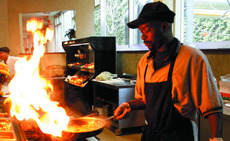Despite their immersion in a city devoted to its meat, Loyola’s herbivores (a person who only eats vegetables) are trying to find their niche in New Orleans.
Whether they like it fried, grilled, barbecued, smothered or étouffée’d, meat-eating diners are sure to find their perfect dish in most of the city’s restaurants. But for vegetarians and vegans, finding a good meal takes more than the guidance of a rumbling stomach.
So where do they go?
Well, Loyola cooks a lot of food. The Orleans Room flaunts cakes and pies under the glass of the bakery counter, while hundreds of sandwiches and wraps are made to order for hungry student bodies. And there’s no denying the ever-present odor of lunch traffic in the Underground, or the endless stream of pizza shooting out of the C-Store.
For the average-American omnivore (a person who eats all foods), these are among the many daily food choices available on Loyola’s campus.
Vegetarians, on the other hand, are limited to foods without meat and often without dairy and other animal-derived ingredients.
To comply with the specific diets of vegetarian students, Loyola’s Dining Services offers its “Greenery” platform, serving up a daily vegan dish, salad bar, veggie burgers and the occasional vegetarian-friendly entree.
But of the People for the Ethical Treatment of Animals’ top-10 vegetarian-friendly colleges of 2006, Loyola and the entire southeast didn’t make the cut, except the University of Florida at No. 10.
Vegetarianism isn’t just raising eyebrows on college campuses. With the birth of television programs like “The Post-Punk Kitchen” on the Food Network and the best-seller status of vegetarian cookbooks, the modern vegetarian diet is gaining serious mainstream momentum.
Vegetarian students are now questioning the durability of existing vegetarian options against this new national interest. According to a 2006 nationwide poll of 100,000 college students surveyed by food-distribution giant Aramark, more than one-fourth felt vegan meal options are important on college campuses.
“Having the vegan entrees is a good start, but it would be nice to have more,” said psychology junior Shaina Chimes, a vegetarian of 10 years. “Even a really good salad bar would be great.”
“I don’t want everything to be handed to me on a silver spoon, but students who aren’t vegetarian have a lot more options, especially in the C-Store and the Underground,” added Spanish and environmental studies junior Sunshine Bond, a self-described “95 percent vegan.”
Bond chose a vegetarian diet after initial inspiration from a vegan former co-worker almost 10 years ago. “Just getting to know her inspired me to make a commitment,” she said.
Additional reasons for her shift to vegetarianism include a strong position on animal rights and various health benefits. “I think they just became cool side effects,” she said.
In fact, a 2006 study conducted by the Physician’s Committee for Responsible Medicine found a low-fat vegan diet can have a dramatic effect on one’s health, combating type 2 diabetes and heart disease.
Unfortunately, many vegetarians, like Bond, find themselves seeking daily meals off-campus, searching for vegetarian-friendly restaurants.
But for resident students, many are bound by their meal plans and Wolfbucks or get stuck on campus without transportation to the nearest veggie hot spot.
Though the C-Store carries many vegetarian and vegan products, from chocolate soy milk to organic frozen meals, prices tend to empty wallets rather than fill stomachs, an expensive thought even shared by non-resident students.
“Prices in the C-Store are usually twice the price found in a grocery store, so it’s not really an option,” Chimes said.
Bond feels that despite the amount of time she spends on campus, there just aren’t enough vegetarian options to get her through the day. “I spend so much of my day here I kind of am forced to eat here,” she said. “It’s kind of unfair (resident students) have to pay the same price as everyone else when there’s not as much choice.”
But for Loyola’s vegetarians, the hope for a more accessible menu is moving in the right direction, a hope that might lift the veil of meat hanging over New Orleans.
“The vegan chefs are doing a really great job,” said Bond. “The vegan menu, overall, is improving.”
Vegan entrees feature cooked-to-order dishes, including specialty wraps, pasta and stir-fry vegetables with tofu.
“It’d be nice to not have to get one thing all the time,” Chimes said.
For the moment, Bond said she is “pleasantly surprised” with Loyola’s vegetarian outreach. “But they could do a lot better,” she said.
This could be the calling card for a less meaty Loyola dining experience, but these vegetarians speculate a slightly different change.
As companies like Whole Foods bring awareness to local produce and environmental care, some believe this may be an opportunity to get others thinking on a healthier level.
With Bond’s speculating the opening of a Tulane on-campus fair-trade store, she believes Loyola could compete with a similar store in the place of the former Mane Attraction in the Danna Center. That option that is being consider by Danna Center directors.
“It could be a student opportunity to buy local produce,” she said. “I’m not sure if they’ll be motivated to buy food, but we do have the space and it’s not being used.”
Chimes agreed a fair trade store might be what Loyola’s vegetarians need most.
Alex Woodward can be reached at adwoodwa@loyno.edu.

(Catherine Cotton and Laura Zubillaga)






